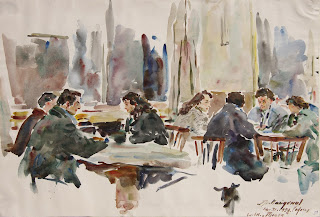This post is perhaps one of the most important I have done in the past four years.
How should one spend the time and whatever other resources one has in the last part of one’s life to best public advantage is the simple question I started to pose more than a decade ago. Rich Americans have a tradition of establishing Foundations (Ford; Rockefeller; Mellon; Soros; Gates) or University Chairs which honour their names.
Those who are merely “comfortably-off” go on world tours or establish Annual Awards.
How should one spend the time and whatever other resources one has in the last part of one’s life to best public advantage is the simple question I started to pose more than a decade ago. Rich Americans have a tradition of establishing Foundations (Ford; Rockefeller; Mellon; Soros; Gates) or University Chairs which honour their names.
Those who are merely “comfortably-off” go on world tours or establish Annual Awards.
Frankly the results don’t seem to offer much inspiration…or original thought
My
2001 note (see last post) was structured around 5 questions which of course were rather ego-
and indeed ethno-centric. They limited the search for answers to those within
my ‘ken and that of the Anglo-Saxon world. But we are in a globalised world
which seems to have become even closer in our (essentially negative) political
assessments as a result of the global financial crisis.
The
update a couple of years back of the original 2001 paper referenced a lot of
books – both political and economic and, as a result, I suspect rather lost focus.
There are simply too many different diagnoses
and prescriptions. Too many prophets and peacocks preening themselves….allocating
blame….and announcing favourite recipes….all within a power structure which
never really seems to change…..
This
is where, perhaps, things have now changed dramatically.
In the first part of
the 20th century educated people had religion, movements and ideologies
to put their faith in.
In
the second part of the century we had things like managerialism and
privatisation (in the US still religion) to give us continued faith that things could and would get better.
But
the tectonic plates seem to have moved in the past decade –
- we have become aware that the “Western
world” is only a small (and declining) part of the world
- we no longer trust the institutions of democracy and the market (let alone faiths) which were the core of our being.
- Corporate and bureaucratic power is evil and the very notion of political power laughable. All that seems left are disaggregated, atomistic and alienated individuals
- with most people no longer believing that the future has anything better to offer
- We cannot therefore agree any more on diagnoses - let alone on prescriptions.
- We are completely at sea…have no engines …nor bearings….
I
wonder whether my readers would accept these assertions?
I am now struggling to pose some questions which might be more helpful than the five with which I started my original paper.............
The painting is an Alexander Moutafov - born in Shumen and educated in Varna, he studied art in Turin between 1899 and 1902; then Munich 1902/03. He was also a war artist
The painting is an Alexander Moutafov - born in Shumen and educated in Varna, he studied art in Turin between 1899 and 1902; then Munich 1902/03. He was also a war artist
It was the Munich experience which aroused his interest in Jugendstil.
From 1921-33, he was professor of Painting in Sofia’s Art Academy. First Bulgarian seascape painter, he laid the basis for this
specialism for subsequent Bulgarian painters. There is, I understand, a museum in his Sozopol house




